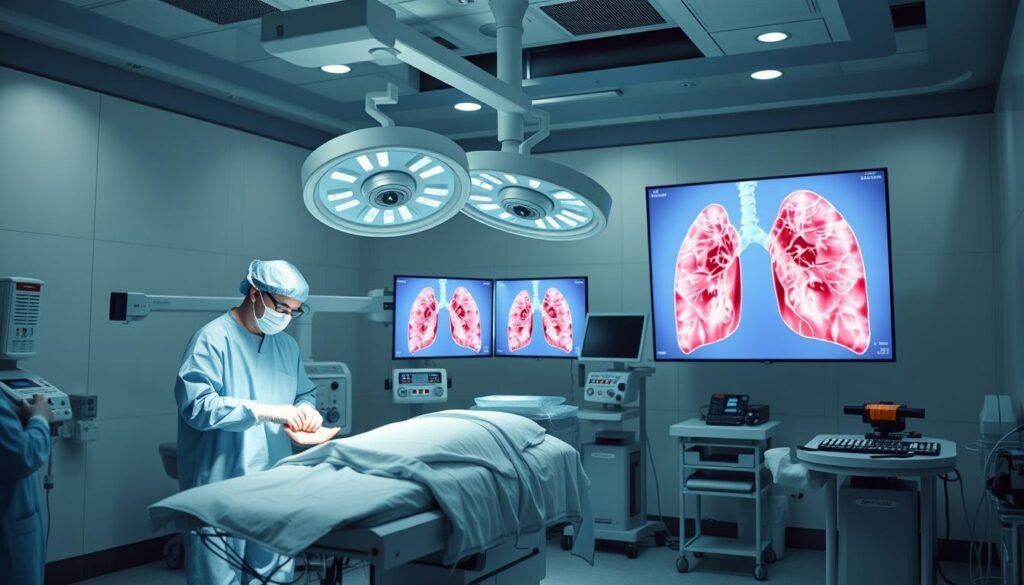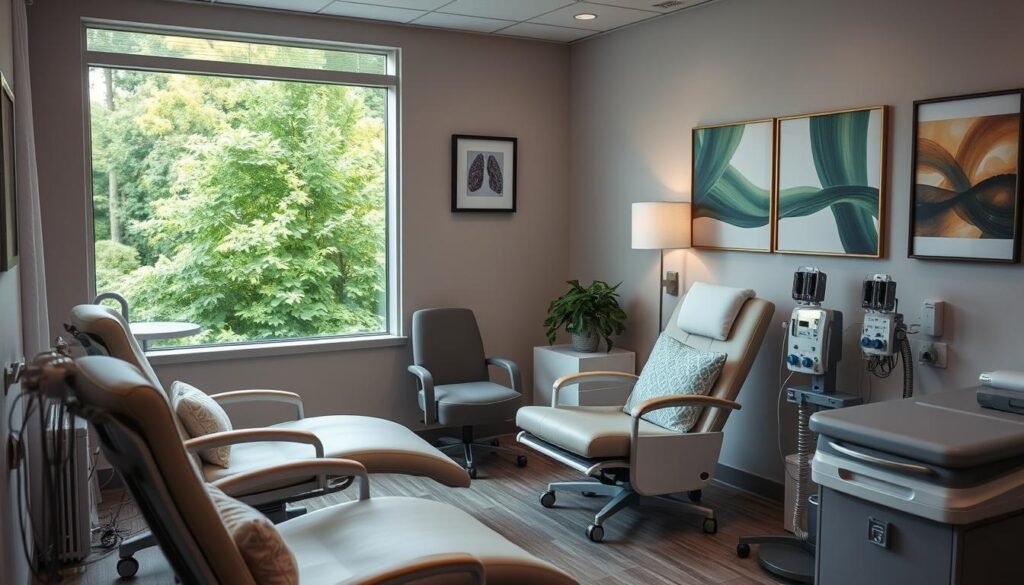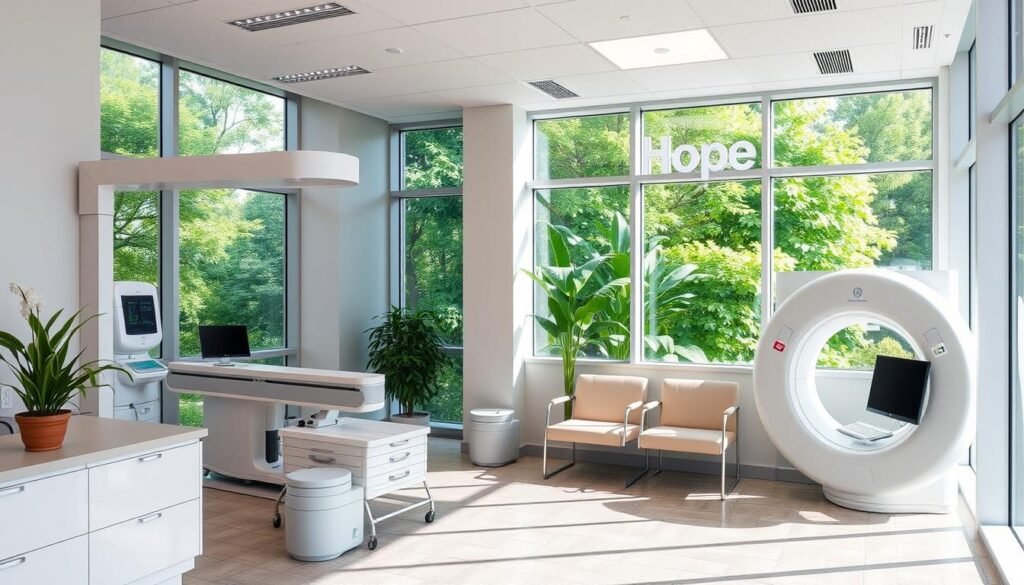Lung cancer is the second most common cancer in the U.S. Non-small cell lung cancer (NSCLC) makes up about 95% of cases. This shows how key it is to find top lung cancer care in NJ. Facilities like RWJBarnabas Health and Rutgers Cancer Institute offer top-notch care. They give thorough check-ups using the latest tools. This lets patients get custom care plans from a team of experts.
The lung cancer hospital in NJ works hard to find cancer early. They make sure treatments fit what each patient needs. Patients get cutting-edge surgeries and supportive care through their healing journey. Having a skilled lung cancer doctor in NJ is crucial. It makes fighting this tough disease a bit easier.
Key Takeaways
- Lung cancer is the second most common cancer in the U.S.
- NSCLC accounts for about 95% of lung cancer cases.
- Early detection through screening can significantly enhance treatment success.
- Multidisciplinary teams create personalized care plans for each patient.
- Access to innovative therapies like immunotherapy provides new hope.
- Comprehensive support services, including smoking cessation programs, are available.
Understanding Lung Cancer
Lung cancer starts in the lung tissue and is a serious health issue. It falls into two main types: non-small cell lung cancer (NSCLC) and small cell lung cancer (SCLC). Knowing these types of lung cancer helps doctors create better treatments. This can improve how patients recover.
Types of Lung Cancer
Non-small cell lung cancer is the most common, making up 85% of cases. It includes types like adenocarcinoma, squamous cell carcinoma, and large cell carcinoma. On the other hand, small cell lung cancer is less common but grows faster. These types of lung cancer affect treatment and recovery chances.
Risk Factors and Causes
Knowing what increases lung cancer risk is key to preventing it. Smoking is the biggest cause. It’s linked to 87% of lung cancer cases. The risk is higher for people who smoke or used to smoke. It goes up with exposure to harmful substances like asbestos and radon. Other causes include genetics, lung diseases, and getting older. Knowing these risks helps people prevent cancer or find it early.
Lung Cancer Diagnosis in NJ
It’s vital to catch lung cancer early. Lung cancer is the second most common cancer for both genders. Timely detection can hugely improve chances of beating it. Programs like screening with low-dose CT scans are proven to find cancer early. They are particularly helpful in NJ, aiding high-risk groups by catching the disease before it shows symptoms. This early action can save lives.
Importance of Early Detection
Finding lung cancer early is key to survival. Screenings can reduce lung cancer deaths by up to 20%. Yet, in New Jersey, screening rates are low, ranked 38th among states. Fortunately, over 95% of lung issues found in screenings are not cancer. A strong screening effort can give people the confidence to get checked early.
Diagnostic Tools Used
To diagnose lung cancer accurately in NJ, doctors use various tools. These tools include:
- Physical examinations
- X-rays
- CT scans
- PET scans
- Biopsies to analyze lung tissue
Doctors use these tools to stage the cancer and decide on the best treatment. NJ is working to improve cancer outcomes. But, some groups face higher hurdles. For example, Black residents are 31% more likely to go untreated post-diagnosis. Also, Black Americans and Pacific Islanders have a 26% lower chance of early diagnosis compared to white residents. Making diagnostic tools accessible to all is crucial for early detection in diverse communities.
| Diagnostic Tool | Description | Purpose |
|---|---|---|
| Physical Examination | A thorough assessment by a medical professional | Initial evaluation for symptoms |
| X-ray | Imaging test to visualize lung structures | Detects abnormalities |
| CT Scan | Detailed imaging providing cross-sectional views | Identifies smaller lesions |
| PET Scan | Utilizes radioactive material to highlight cancer cells | Staging and metastasis evaluation |
| Biopsy | Sampling of lung tissue | Confirms presence of cancer |
Lung Cancer Treatment in NJ
In New Jersey, lung cancer treatment uses a team approach. A group of cancer experts including oncologists, surgeons, and nurses work together. They aim to create the best care plan for each patient.
This team talks a lot to make sure everything is covered. Their goal is to treat lung cancer effectively by understanding everyone’s unique needs.
Multidisciplinary Treatment Approaches
Different specialists join forces to offer more options for treating lung cancer. They use their skills to support the patient in every way. Oncologists may use drugs, while surgeons could operate if the cancer is found early.
They also use modern technology to figure out where the cancer is. This helps them decide the best way to treat it.
Personalized Care Plans
Every lung cancer patient is different and needs a special plan. ACOHA makes plans that consider what the patient wants and their health history. This way, treatments like targeted therapy work better.
Things like radiation are used to attack the cancer directly. They’re part of a custom plan to fight lung cancer in different stages.
Lung Cancer Surgery in NJ
In NJ, surgery for lung cancer comes in different forms to treat the disease well. Each patient gets a plan based on their cancer stage and health. Options include lobectomy, pneumonectomy, segmentectomy, and wedge resection. Robotic-assisted surgery has made these operations less invasive and more precise.
Types of Surgical Procedures
Here’s a quick look at the main surgeries for lung cancer:
| Procedure Type | Description | Typical Uses |
|---|---|---|
| Lobectomy | Removal of a lung lobe | Effective for early-stage lung cancer |
| Pneumonectomy | Removal of an entire lung | Advanced lung cancer cases |
| Segmentectomy | Removal of a segment of the lung | Patients with smaller tumors |
| Wedge Resection | Removal of a small, wedge-shaped portion of lung | Minimally invasive option |
Post-Surgery Recovery and Care
Recovery and care after surgery are crucial for lung cancer patients. It includes pain management, support for breathing, and monitoring for issues. There’s also physical rehab to get stronger and psychological support for mental health.
Patients get help from dedicated recovery programs to return to normal life smoothly. Comprehensive care involves both the body and mind. Teams at places like Columbia University and Valley’s Lung Cancer Center show deep dedication to full care. Learn more about top lung cancer oncologists by visiting this resource.

Lung Cancer Radiation Therapy in NJ
Lung cancer radiation therapy in NJ marks a big step forward in treating cancer. It uses advanced methods to aim treatments accurately. This helps to hit the target well and protect healthy tissue.
Advanced Radiation Techniques
New radiation methods like stereotactic body radiotherapy (SBRT) are helping patients. Those who can’t have surgery might get SBRT instead. It gives a strong dose of radiation in a short time. New Jersey’s facilities use top gear like Truebeam, Halcyon, and CyberKnife for better accuracy.
People with tough lung cancer often need both chemotherapy and radiation. They might get treatment every day for a few weeks. For critical cases, radiation eases symptoms. Techniques like GammaKnife focus on brain tumors with precision.
Side Effects and Management
Radiation therapy can cause issues like tiredness, skin problems, and breathing troubles. Handling these side effects well is important for patients’ comfort and health.
- Talking with doctors about possible side effects helps.
- Using medicine as advised can ease pain and discomfort.
- Changing some lifestyle habits helps in recovery.
Patient care involves a team approach with doctors, nurses, and therapists. They work together to give personalized care. This ensures the best results from treatment.
Lung Cancer Chemotherapy in NJ
Chemotherapy is key in fighting lung cancer. It uses strong drugs to stop cancer cells from growing rapidly. People with lung cancer may get chemotherapy through IV or pills. It can be the main treatment, or used before or after surgery to kill remaining cancer cells.
How Chemotherapy Works
Chemotherapy for lung cancer in NJ depends on the kind of lung cancer you have. Most lung cancers are non-small cell lung cancer (NSCLC), making up 80-85% of cases. For these patients, chemotherapy can lead to better health outcomes. It targets and kills cancer cells, improving chances of beating the disease. The treatment plan depends on the cancer’s type and stage.
Combining Chemotherapy with Other Treatments
Combining treatments is often best for lung cancer. Adding chemotherapy to radiation therapy and immunotherapy attacks the disease from different angles. Chemotherapy and radiation together work better for advanced lung cancer. This combo makes treatment more powerful and can extend lives.
The Lung Cancer Institute at Cooperman Barnabas Medical in NJ offers custom treatment plans. Chemotherapy might be a main part of your care. The goal is to choose the best treatment for each person’s unique situation.

Lung Cancer Immunotherapy in NJ
Lung cancer immunotherapy is a major breakthrough in cancer care, offering hope to New Jersey patients. It uses the immune system to fight lung cancer. Treatments like pembrolizumab work against certain types of lung cancer.
Innovative Treatment Options
Immunotherapy has changed lung cancer treatment in the last 20 years. It boosts the body’s defenses and can be given through IVs or pills. Immunotherapy includes:
- Nonspecific immune stimulation
- T-cell transfer therapy
- Immune checkpoint inhibitors
These methods are effective against lung cancer. Places like Rutgers Cancer Institute lead in this research and treatment.
Potential Benefits and Considerations
Immunotherapy offers lasting defense against cancer return, with fewer side effects than chemo. However, patients should know about possible immune side effects. It’s vital to keep learning and talking about these treatments.
Lung Cancer Clinical Trials in NJ
Clinical trials are key to advancing lung cancer treatment. They focus on new therapies and check how well drugs work. In New Jersey, lung cancer patients have access to many clinical trials. This is thanks to partnerships between major healthcare providers like RWJBarnabas Health and Rutgers Cancer Institute. These programs offer hope to those with advanced stages of cancer, aiming to manage the disease and improve life quality.
The Role of Clinical Trials
Joining lung cancer clinical trials gives access to new treatments not found in regular care. Cancer experts work with scientists to bring these new options to patients. If you join, you get care that focuses on your health. Plus, you help advance lung cancer research for the future.
How to Participate in Clinical Trials
Signing up for clinical trials is voluntary. You can leave the study at any time. To get started, talk to your doctor about whether you might be a good fit. Discuss the details of joining. RWJBarnabas Health and Rutgers Cancer Institute are among the “100+ Hospitals and Health Systems with Great Oncology Programs” in 2024. They offer outstanding chances for patients to join lung cancer research.
| Key Features of Lung Cancer Clinical Trials | Description |
|---|---|
| Advanced Research | Access to cutting-edge therapies that are shaping the future of cancer care. |
| Top Institutions | Involvement of institutions like John Theurer Cancer Center, known for its extensive clinical trial offerings. |
| Inclusivity | Commitment to diversity ensures trials are available to all patients regardless of background. |
| Patient-Centric Care | Patients are informed about risks and benefits prior to trial enrollment and are supported throughout the process. |
Lung Cancer Support Groups in NJ
Support networks are crucial for those with lung cancer. They provide shared experiences and understanding from facing similar challenges. In NJ, lung cancer support groups offer emotional support. This helps patients connect and find resilience and hope.
Emotional and Practical Support
Lung cancer support goes beyond emotional comfort. It includes practical assistance. Being part of a group can greatly improve how well people cope. Research shows support makes quitting tobacco four times more likely.
Groups for seniors and those with lung cancer are special. They offer a caring space to share feelings, insights, and resources.
Available Resources for Patients
New Jersey has many resources for cancer patients. CancerCare runs programs like:
- A 12-week live support group for older adults (65+) diagnosed with cancer, meeting Wednesdays from 11:30 a.m. to 1 p.m. ET.
- An 8-week live writing group for individuals ages 18+, held Thursdays from 4:30 to 6 p.m. ET.
- Biweekly support for individuals diagnosed with breast cancer or gynecological cancers on Mondays from 5:30 to 7 p.m. ET.
- A Spanish-speaking patient support group that meets biweekly on Wednesdays from 5:30 to 7:00 p.m. ET.
- Caregiver support groups meeting biweekly on Mondays from 5:30 to 7 p.m. ET.
Oncology nurse navigators help guide lung cancer patients. They make sure patients understand their options. There are programs for rehabilitation, palliative care, and support for patients and families.
New Jersey’s Leading Lung Cancer Specialists
New Jersey is known for its top lung cancer specialists. These experts offer comprehensive care across the state. Centers like RWJBarnabas Health and Rutgers Cancer Institute stand out. Here, top doctors work together to push lung cancer treatments forward.
Meet the Experts
In New Jersey, a wealth of skilled lung cancer specialists enhances patient care. These doctors are at the forefront of cancer research. They specialize in various areas, ensuring personalized and effective treatment for each patient.
The Importance of Specialty Care
Specialty lung cancer care brings many advantages. It combines different treatments, including new therapies, to create customized care plans. This approach leads to better outcomes and educates patients on their options. Specialized services also offer improved symptom management and life quality.

| Specialty | Focus Areas | Innovative Treatments Offered |
|---|---|---|
| Medical Oncology | Comprehensive cancer management | Chemotherapy, targeted therapies |
| Surgical Oncology | Resection of lung tumors | Minimally invasive procedures |
| Radiation Oncology | Precise tumor targeting | Proton therapy, SBRT, IMRT |
| Research & Trials | Evaluating new treatments | Access to clinical trials through local programs |
Choosing a lung cancer specialist offers more than just treatment. Support groups, nutritional counseling, and holistic therapies are vital too. This holistic approach places patients on the road to better health and support.
Conclusion
The journey in dealing with lung cancer in New Jersey focuses on full lung cancer care. It combines advanced medical treatments with caring support. This disease is the second most common among men and women. The state provides different services for early detection and new treatments. Proactive health actions, like low-dose CT scans, lower lung cancer deaths a lot. This highlights why it’s important to stay ahead of health issues.
Risk factors, especially smoking, are taken seriously by healthcare workers. They push for education and ways to prevent lung cancer. The Rutgers Tobacco Dependence Program helps a lot by giving people resources to stop smoking. Smoking is behind almost 90% of lung cancer deaths. Even non-smokers need to be careful, as they can get lung cancer too.
Now, there are better options for treating lung cancer, like targeted therapies and immunotherapy. These have greatly improved patients’ chances. As patients face this hard journey, being aware of resources like screenings and support is key. For more on efforts to fight cancer and its effects, check out this resource. The health professionals working on lung cancer care in NJ are making big steps toward better results for everyone.